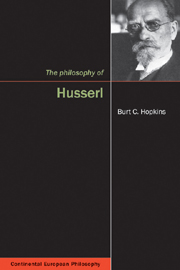Book contents
- Frontmatter
- Contents
- Acknowledgements
- Abbreviations
- Prolegomenon: Husserl's turn to history and pure phenomenology
- I Plato's and Aristotle's theory of eidē
- II From descriptive psychology to transcendentally pure phenomenology
- 4 Origin of the task of pure phenomenology
- 5 Pure phenomenology and Platonism
- 6 Pure phenomenology as the transcendental-phenomenological investigation of absolute consciousness
- 7 Transcendental phenomenology of absolute consciousness and phenomenological philosophy
- 8 Limits of the transcendental-phenomenological investigation of pure consciousness
- III From the phenomenology of transcendental consciousness to that of monadological intersubjectivity
- IV From monadological intersubjectivity to the historical a priori constitutive of all meaning
- V The unwarranted historical presuppositions guiding the fundamental ontological and deconstructive criticisms of transcendental philosophy
- Epilogue: Transcendental-phenomenological criticism of the criticism of phenomenological cognition
- Coda: Phenomenological self-responsibility and the singularity of transcendental philosophy
- Notes
- Bibliography
- Index
8 - Limits of the transcendental-phenomenological investigation of pure consciousness
from II - From descriptive psychology to transcendentally pure phenomenology
- Frontmatter
- Contents
- Acknowledgements
- Abbreviations
- Prolegomenon: Husserl's turn to history and pure phenomenology
- I Plato's and Aristotle's theory of eidē
- II From descriptive psychology to transcendentally pure phenomenology
- 4 Origin of the task of pure phenomenology
- 5 Pure phenomenology and Platonism
- 6 Pure phenomenology as the transcendental-phenomenological investigation of absolute consciousness
- 7 Transcendental phenomenology of absolute consciousness and phenomenological philosophy
- 8 Limits of the transcendental-phenomenological investigation of pure consciousness
- III From the phenomenology of transcendental consciousness to that of monadological intersubjectivity
- IV From monadological intersubjectivity to the historical a priori constitutive of all meaning
- V The unwarranted historical presuppositions guiding the fundamental ontological and deconstructive criticisms of transcendental philosophy
- Epilogue: Transcendental-phenomenological criticism of the criticism of phenomenological cognition
- Coda: Phenomenological self-responsibility and the singularity of transcendental philosophy
- Notes
- Bibliography
- Index
Summary
Intuition of the unity of the one, infinite, stream of lived-experience as an idea in the Kantian sense
Husserl's account of the unity of the lived-experiences that belong to the pure Ego in accordance with the primal form of consciousness, however, encounters a limit in the scope of the givenness of this unity to and by the pure “regard” of its (the unity's) reflection by the pure Ego. The essential incompleteness of the evidence in which the immanent contents of any lived-experience is given, which, as noted earlier, is a consequence of its mode of synthetic connection as a flux, means that “by essential necessity this whole connection is never given or to be given by a single pure regard” (Ideas I, 166). Nevertheless, Husserl maintains that it can be given in the manner of an idea in the Kantian sense. By this Husserl has in mind Kant's understanding of an idea as something that prescribes the rules that govern and therefore limit the thought of that which cannot be grounded in a perception unified by the categories of thought. Such “regulative ideals” were necessary for Kant, because, on his view, not all the objects of thought have limits determined by the intuition, or, what is the same thing for him, the sense perception of an object. According to Husserl, the whole of the in principle unencompassable synthetic connection of the three temporal dimensions of the one stream of lived-experience that belongs to the pure Ego can be “seized upon” by that Ego in the manner of an “idea in the Kantian sense”.
- Type
- Chapter
- Information
- The Philosophy of Husserl , pp. 139 - 147Publisher: Acumen PublishingPrint publication year: 2010

